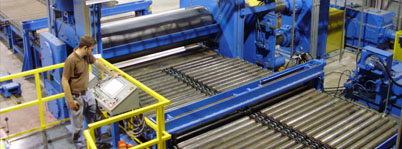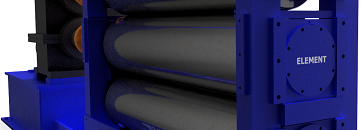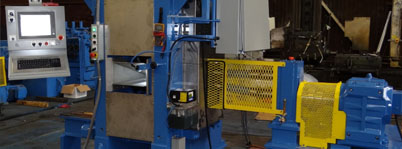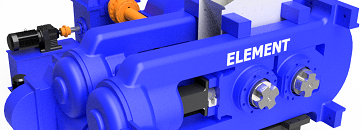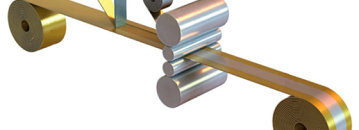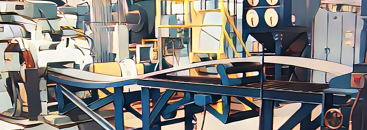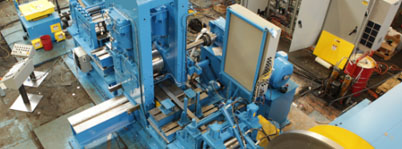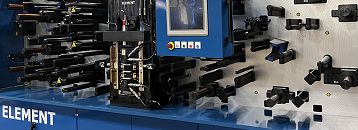Specialized rolling mills that emboss a pattern or indent into metal strip are known as embossing mills. These patterns can be used for decoration, to help with structural qualities of tubing or simply to increase material length without significantly decreasing the material thickness for cost savings.
When embossing material, as by its nature you are imparting variable stresses across the material width, you must tightly control certain rolling parameters.
Element has experience building and controlling embossing mill processes to achieve accurate depth and width characteristics, while maintaining good material shape.
Embossing ROLLING MILL EQUIPMENT OPTIONS
With any Element Rolling mill, we offer several options that are available to increase the productivity of your equipment. Some of the options that we offer to maximize the capacity of our mills include:
- Quick roll change out options
- Repetitive reduction schedules
- Automatic gauge control features
- Embossed pattern profiling systems
- Finite tension control systems
- Zoned lubrication systems with specialized lubricants
Element mills offer a wide range of feed back options for roll positioning that provide tight output tolerances. Our most accurate design incorporates non contact positive roll detection that can provide output to tolerances of better than +/-0.0001″ (+/- 4um).
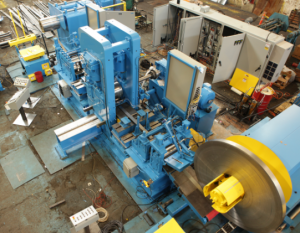
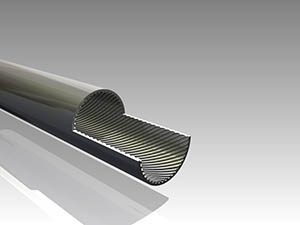
Embossing ROLLING MILL EXPERIENCE
Element has experience supplying embossing mills designed for specialized separating forces and outgoing materials. These mills are typically part of our total line equipment with coil processing handling equipment to provide the level of control necessary on the material processing.
MINIMUM |
MAXIMUM |
|
|---|---|---|
| Material Thickness | 0.020″ (0.508 mm) | 0.25″ (6.35 mm) |
| Material Width | 1″ (25.4 mm) | 20″ (508mm) |
| Coil Weight | 500 lbs (228 kg) | 25,000 lbs (11340 kg)) |
| Separating Force | 50 UST (45 MT) | 700 UST (630 MT)) |
| Line Speed | 5 FPM (1.5 MPM) | 200 FPM (60 MPM) |
| Thickness Tolerance | +/- 0.0005″ (0.0127 mm) | +/- 0.002″ (0.051 mm) |
WHAT WE OFFER
2 High Rolling Mill
Rolling mills consisting of two rolls are known as a 2 High Rolling Mills and are used for anything from temper pass to breakdown of the material.
3 High Rolling Mill
A 3 High Rolling Mill consists of three rolls and is typically used for either performing multiple reduction passes by wrapping material around the center mill roll, or for bonding of dissimilar stacked material passed through the mill. Three High Rolling Mills can also be used for flattening of expanded metal sheets.
4 High Rolling Mill
A four roll configuration is known as a 4 High Rolling Mill, whereby the work rolls are generally smaller in diameter supported by larger backup rollers. These mill can be used for tighter tolerance output material, and for reducing material to extremely small thicknesses.
Compacting Rolling Mill
Compacting rolling mills are used for converting powder or powder like material into continuous strip.
Cladding Rolling Mill
Cladding rolling mills are used to combine two dissimilar materials into a single strip through compression.
Casting Rolling Mill
Casting rolling mills are used for continuous roll casting of strip. Casting rolling mills are typically 2 or 4 high hot mills capable of providing consistent thickness strip from hot cast incoming material.
Embossing Rolling Mill
Specialized rolling mills that emboss a pattern or indent into metal strip are known as embossing mills. These patterns can be used for decoration, to help with structural qualities of tubing or simply to increase material length without significantly decreasing the material thickness for cost savings.
Lithium Metal Processing
We supply a broad range of machinery and services to help in your lithium metal processing application.
HOW CAN WE HELP YOU?
Give us a call (855) 447-7648 or send us a message here.


